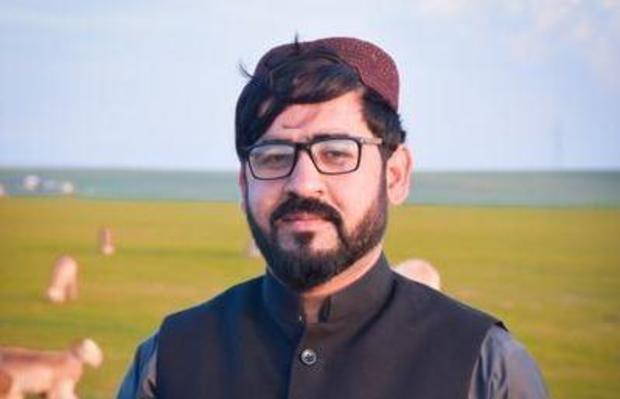Taliban arrests prominent Afghan education campaigner Matiullah Wesa, founder of the Pen Path organization
Afghanistan's Taliban regime arrested a well-known education campaigner this week for his work and for holding "meetings with Westerners," as the Islamic hardliners continue their efforts to stamp out dissent and keep girls out of school. The United Nations mission in Afghanistan said Matiullah Wesa, the founder of the Pen Path organization which has spent more than a decade advocating for education access and campaigning against corruption, was arrested Monday in Kabul as he returned from a trip to Belgium.
Matiullah, 30, brought his mobile library and advocacy to some of Afghanistan's most remote regions in a bid to improve access to education, including for girls, and highlight corruption in Afghanistan's national educational system.
Men, women, elderly, young, everyone from every corner of the country are asking for the Islamic rights to education for their daughters. Penpath female volunteers calls for girls education and their rights to education #PenPathGirlsEduCampaign #PenPathGirlsEduCampaign pic.twitter.com/gekG7fsGKj
— Matiullah Wesa مطيع الله ويسا (@matiullahwesa) March 26, 2023
The Taliban didn't provide any detail about the reasons for Wesa's detention, but one senior official with the group confirmed to CBS News that the activist was in "custody" after his arrest, which was "linked to his activities and high-level meetings with Westerners." The Taliban official spoke to CBS News on condition of anonymity as they were not authorized to discuss the matter.
Wesa had visited Belgium and held meetings with various European Union officials to explain the worsening circumstances for women and girls in regard to education in Afghanistan. He also met with U.N. officials and foreign diplomats in Kabul, all of which is believed to have annoyed the Taliban and led to his arrest this week.

Attaullah Wesa, the activist's older brother who is not in Afghanistan, told CBS News that Matiullah and one of his other brothers had gone to a mosque to offer prayers as normal early Monday evening when two pick-up trucks full of armed Taliban members arrived and took Matiullah away.
"We are a family of educational campaigners, and we won't stop raising our voices for education for every child in Afghanistan," Attaullah Wesa told CBS News.
Taliban forces raided the family home in Afghanistan on Tuesday, "detained my two other brothers and took everyone's phones, laptops and valuable belongings," Attaullah said.
"Our house was under siege by the Taliban," he said. "My two totally innocent brothers were taken and tortured."
He described it as "a barbaric act committed by the Taliban against neutral people," and he called on the "international community and Afghans, help us; we are not military types. We are just people who believe in the power of the pen."
Recently we travelled to 24 districts in the country to speak to elders and locals and discuss girls schools and to...
Posted by Pen Path on Thursday, March 23, 2023
Matiullah Wesa's arrest comes just after the start of the new school year in Afghanistan, which, as CBS News reported, got off to a rocky start with completely empty classrooms on day-one as the Taliban authorities neglected to inform parents that school was starting on what had long been observed as a public holiday.
Classes are less full anyway as the Taliban has barred girls over the age of 12 from attending schools. The group's domestic intelligence agency has detained a number of activists who campaigned for women's education.
Wesa's last tweet, before his arrest, showed women working as volunteers for his Pen Path organization, "asking for the Islamic right to education for their daughters."
The Wesa family is from Afghanistan's southern Kandahar region, the traditional home turf of the Taliban. They have remained among the few to continue pushing for fair education access in the region since the Taliban reclaimed power over the country with the U.S. withdrawal in August 2021.
Wesa's arrest drew worldwide condemnation, with the U.N.'s special rapporteur for human rights in Afghanistan, Richard Bennett, saying he was alarmed by the activist's detention.
"His safety is paramount & all his legal rights must be respected," Bennett said on Twitter.
The hashtag #ReleaseMatiullahWesa quickly started gaining steam on social media platforms.
Afghan poet and writer Matiullah Turab, in a tweet, condemned the activist's arrest, calling him "a kind, honorable, patriotic, educated young man who is saddened by the grief of his countrymen."
"There were many opportunities for him to leave the country, but he did not want to go anywhere and was thirsty for the prosperity and progress of his countrymen," said Turab.
- In:
- Taliban
- Human rights
- Education
Disclaimer: The copyright of this article belongs to the original author. Reposting this article is solely for the purpose of information dissemination and does not constitute any investment advice. If there is any infringement, please contact us immediately. We will make corrections or deletions as necessary. Thank you.







